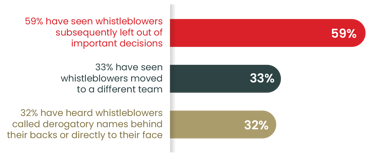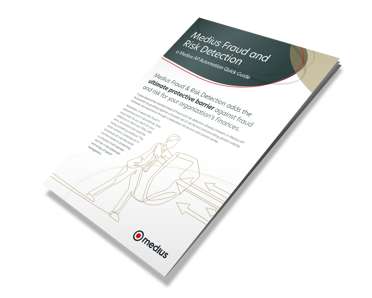How to empower whistleblowers in your company to prevent internal fraud
- Internal organizational fraud
- Why whistleblowing matters
- Whistleblowers are scared to report fraud
- Get a whistleblowing policy and empower your team
- Whistleblowing policy + AI-powered fraud prevention in accounts payable: the gold standard
- Get smart about fraud with AI-backed technology
- More fraud prevention strategies
Hear what's covered in this article:
Research shows that whistleblowers hesitate to report fraud– a significant challenge to address.
Earlier this year, we shared the Top challenges for accounts payable and finance professionals in 2024, based on Medius and Censuswide’s 2024 Financial Census. The annual research highlights the key issues today’s finance teams are up against, which include invoice fraud, deepfake scams, internal fraud and whistleblowing fears, and talent retention.
We also did a deeper dive into deepfake scams in accounts payable and how to prevent them.
Now, let’s look closely at another crucial yet often overlooked fraud prevention tactic for combatting internal fraud: whistleblowing.
AI-backed accounts payable (AP) automation helps reduce fraud risk, but whistleblowers are truly unsung heroes in keeping financial integrity intact. Yet, they often hold back on reporting what they see for fear of recrimination.
Read on to see why whistleblowing is an important element in your fraud protection plan and how you can empower your team.
Internal organizational fraud happens. What you should know.
Sometimes referred to as occupational fraud, internal fraud happens when an employee, manager, or executive tricks their own organization. Think of common schemes you hear like embezzlement, tax cheating, and lying to investors and shareholders.
According to the Association of Certified Fraud Examiners (ACFE), internal fraud accounts for at least five percent of revenue loss. That may not sound like much, but it's a median loss of $145,000 per case, and an average loss per case is $1.7 million.
It happens more often than you think, and likely more than the statistics show – because there is a lot that is not caught.

Why whistleblowing matters
Fraud costs businesses billions each year, with scams from asset misappropriation to financial statement fraud. While financial controls can spot some discrepancies, fraudsters are becoming increasingly clever, using tactics that slip past detection. That’s where whistleblowers come in. Employees, customers, and external partners who notice suspicious behavior are often our first line of defense. A whistleblower’s insider knowledge can reveal fraud that technology might overlook.
Data from ACFE says that when internal fraud is flagged, the most common way it’s reported is by another internal employee. A staggering 43 percent of frauds were detected by tips, three times more than the next common method.
A few more internal fraud stats to keep in mind:
A typical fraud case lasts 12 months before detection
Asset misappropriation schemes are the most common, representing 89% of cases
Financial statement fraud is the least common but most costly, costing $766,000 median loss
Billing schemes represent 22% of all cases
Check and payment tampering represent a $155,000 median loss
Billing schemes represent a $100,000 median loss
There’s a lot at stake, which is why it’s important to take all fraud prevention steps, including whistleblowing.
But whistleblowers are scared to report fraud
Research from Medius’s 2024 Financial Census raised a significant challenge to the surface: fear of reporting internal fraud.
More than 80 percent of financial professionals stay silent on suspected fraud for fear of retaliation. More than half of professionals like yours in finance and accounts payable noted they witnessed internal fraud in the workplace, but they didn’t report it. Why?

They are scared of repercussions –
getting fired, getting written up, and being ostracized.

Think of your own organization's employees – how are whistleblowers empowered or protected? Do your employees feel comfortable reporting potential internal threats? These are questions to ask and processes to evaluate.
The first step is to implement a whistleblowing policy.
Get a whistleblowing policy and empower your team
The mere existence of whistleblower policies within an organization can deter potential fraudsters. More importantly, you should empower your team with the confidence to report. Knowing that employees are empowered and encouraged to report misconduct fosters an environment of accountability.
More than a staggering 93 percent of workers say they would feel more comfortable if they had more evidence, and 48 percent say they’d speak up if they thought the legal system protected them better.
Having fraud prevention software and solutions is important, but so are people. People often spot patterns, behaviors, and red flags that sometimes systems overlook. For example, if an employee notices a recurring issue with vendor payments or sees strange invoice patterns and reporting those observations could help uncover fraud before it affects the business.
A few important things to build into your whistleblowing policy:
Confidentiality
Protecting the identity of whistleblowers is essential to encourage reporting without fear of retaliation.
Clear reporting channels
Employees should know how and where to report concerns, whether through internal channels or third-party platforms.
Training & awareness
Regular training can help employees understand what constitutes fraud and how to report it.
Non-retaliation protections
A zero-tolerance policy against retaliation ensures that whistleblowers are not punished for speaking up.
Whistleblowing policy + AI-powered fraud prevention in accounts payable: the gold standard
Employees need to feel safe and empowered to report internal fraud, but they also need to be equipped with fraud prevention tools and automation that give them confidence and support.
According to Jim Lucier, CEO of Medius, “White collar crime is on the rise, and no organization is safe. Employees are the last line of defense against fraud, but confidence to report suspicious activity is declining. AI anomaly-detection technology can provide employees with the evidence and assurances they need to be more forthcoming. Building a culture where employees feel comfortable reporting their suspicions could save organizations millions in the long run.”

Get smart about fraud with
AI-backed technology.
Medius Fraud & Risk Protection adds the ultimate protective barrier against fraud and risk for your organization’s finances. This enhanced protection against fraud fights fraud with the benefit of AI-backed technology, so you can trust that only real invoices are being paid to the correct suppliers, and that your company’s hard-earned profits are safeguarded against bad actors and potential threats. Read our product quick guide to learn more.
Want to learn more about fraud prevention strategies and
what Medius is doing to combat fraud in accounts payable?
Get the stats on whistleblowing
Seven Red Flags and Prevention Tips for Detecting AP Fraud
Listen to the Accounts Deceivable podcast for tips, tricks and real stories







